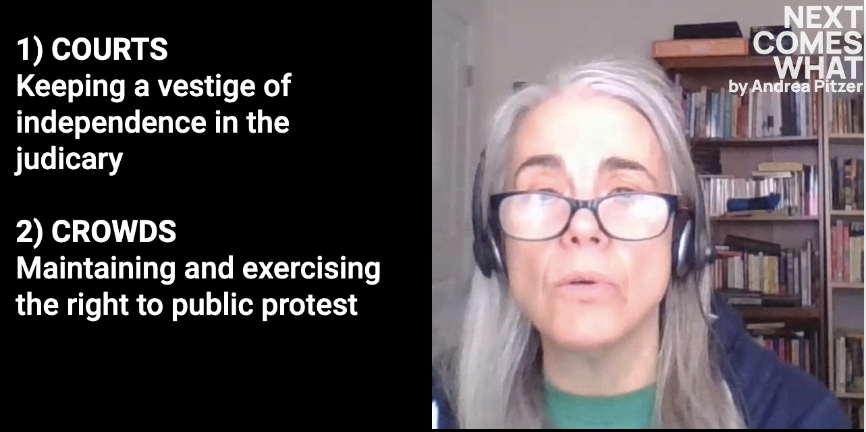The courts alone won't save us

Donald Trump has begun to turn his fire on the one man, besides Mark Burnett, who did the most to make his presidency possible.
The president, in a post on his social media platform, slammed Leonard Leo, the former chair of the Federalist Society, calling him a “sleazebag” who “probably hates America.”
It was a striking characterization of Leo, who played a key role in working with Trump to shape the conservative Supreme Court.
We all know by now that the Leopard-Who-Eats-Faces-in-Chief will eventually come for any face that gets in his way. But you have to imagine that Leo might be at least amused to discover that his lifetime of undermining how the Constitution was written was to prevent the tyranny of demagogues like Donald Trump has now come for his face.
But who cares about Leonard Leo?
What matters is that Trump has turned his sights on the only branch of our government left to contain him. And the courts have been overwhelmingly diligent in their efforts to hold Trump accountable to the law, with some notable exceptions from the Republicans on the Supreme Court, who were chosen to undermine our checks and balances by the system created by Leonard Leo.
Adam Bonica, a Professor of Political Science at Stanford, noted:
In May 2025, federal district courts ruled against the Trump administration in 26 of 27 cases—a stunning 96% loss rate.
But Bonica also noted at the close of that report:
Without broader mobilization, May's 96% will become a historical footnote about the month the judiciary tried—and failed—to hold the line.
If you're like me, constantly seeking reassurance from anything and anyone, you'd want to follow that conclusion with a big, "WHAT DO YOU MEAN, ADAM BONICA? BE SPECIFIC!"
Thankfully, Adam Bonica has explained precisely what he means.
He's described how authoritarians engage in a "deliberate strategy to delegitimize and ultimately control any judicial body that dares to stand in their way," how Trump fits into that pattern, and how to respond to these threats effectively.
And he did it in both post and thread form!
Read either in full, but for our purposes, here are some main points about why we must take Trump's attacks on "USA HATING JUDGES" and “communist radical-left judges” seriously, NOW.
Bonica notes that authoritarians are going to authoritarian.
If anyone proves how unoriginal authoritarian tactics are, it's the repetitive nature of these attacks. Zimbabwe's Robert Mugabe, Hungary's Viktor Orbán, Venezuela's Hugo Chávez—they all read from the same script.
We know what is coming because Bonica gave us the playbook.
The Authoritarian Playbook
The pattern is frustratingly predictable:
- A court rules against the leader
- The leader attacks judges personally—calling them biased, corrupt, or "enemies"
- They work to delegitimize the entire judicial system
- This creates permission for supporters to threaten and intimidate judges
- If there is no or insufficient mass resistance → They capture the courts
- If there’s sustained, broad resistance → They're forced to pause or retreat
What does "sustained, broad resistance " look like? Bonica uses extremely recent examples in Israel and Poland to show how successful oppositions work—and how they don't.

The key is "immediate, broad" coalitions.
And Bonica offers us a clear Anti-Authoritarian framework:
- ACT IMMEDIATELY—don't wait for the first purges. Poland shows us that once judges start being removed, it's almost too late
- BUILD broad coalitions—this isn't about party politics. When lawyers, tech workers, veterans, and business leaders unite, power listens
- PREPARE for economic action—protests matter, but general strikes change the game
- FRAME it correctly—this isn't left versus right; it's democracy versus authoritarianism
"The truth is that mass protests are no guarantee of success," he writes. "But without mass protests in Poland, the situation would likely have deteriorated further and faster."
Even the magic 3.5% participation rate at peak moments, which often changes governments, may not be enough. However, protest movements are likely to at least place some check on the damage done and lay the groundwork for success in the future.
Andrea Pitzer—in her podcast NEXT COMES WHAT, which I produce—has noted that from her work looking at concentration camps around the globe there are two primary checks on wannabe dictators:

Bonica demonstrates how these two checks are in a symbiotic relationship. Without one, the other is worthless.
Elizabeth Goitein at the Brennan Center has noted that if an executive won't heed the judiciary, the people are the only means of enforcing the law:
Therefore, we must fixate on building coalitions.
Part of how we do that is framing what the courts actually do. We have to break out of the GOP's half-century-long campaign to insist that the courts' job is to implement a vision of power that happens to match their own.
The courts exist, to paraphrase Marcy Wheeler, so people have recourse in case of injustices. Otherwise, we are just abused children, doomed to be locked in our dark rooms until the tyrant grants us a crack of light.
If we have no recourse in the courts, we are forced to demand it in the streets. We know that's coming.
If we're not ready, we're surrendering in advance.
THE FARCE fights fascism with fearlessness. Subscribe to fuel the Farce—free or paid, your support matters. To help us grow, you can always drop us a tip.

Member discussion